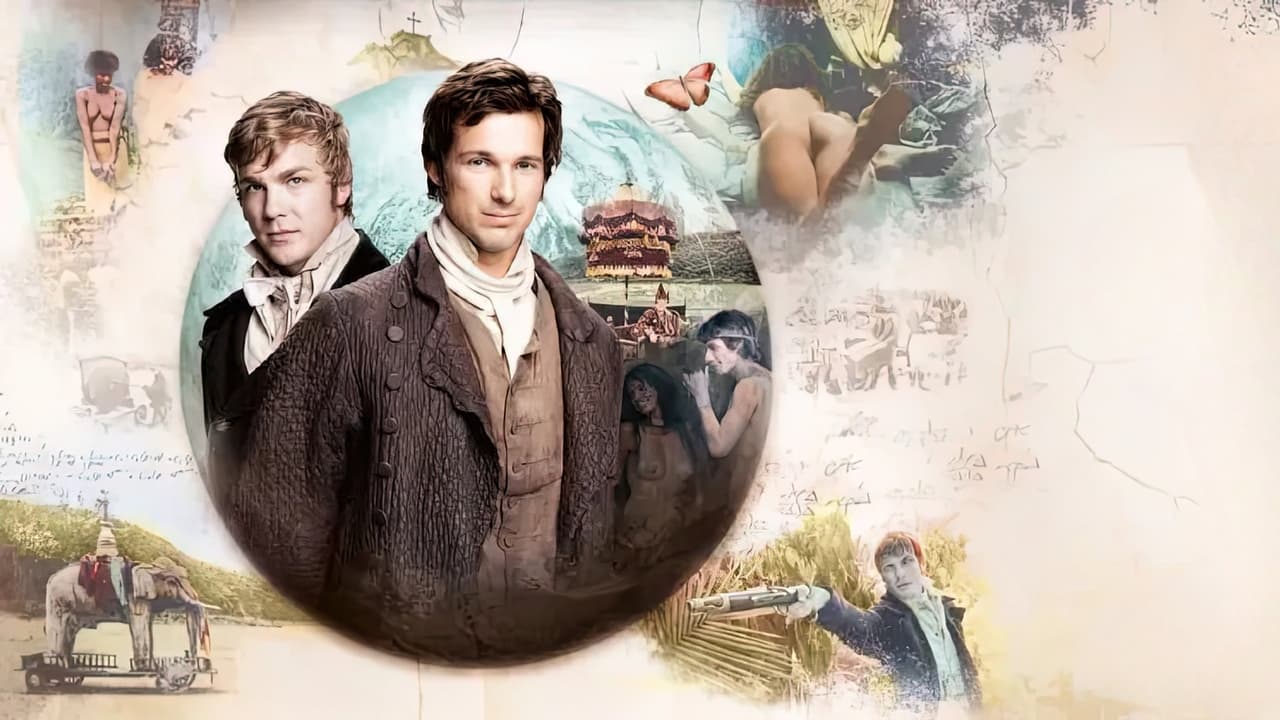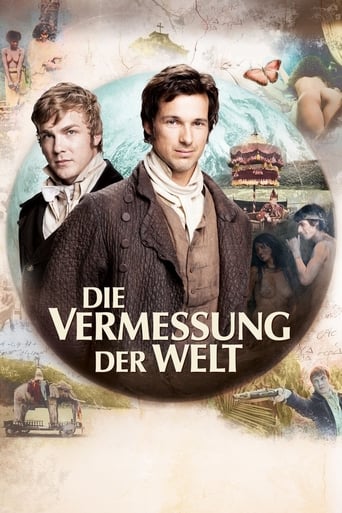

Too many fans seem to be blown away
... View MoreDisappointment for a huge fan!
... View MoreAbsolutely brilliant
... View MoreAbsolutely amazing
... View MoreIt is very easy to write than Gauss and von Humboldt are reduced as fictional sketches, first by novel, than by its adaptation. but the film has two virtues - to be a start point for viewer to discover the life of two great scientists and to admire the spirit of period. the basic sin of film - the bizarre use of humour and the not inspired links between the lead characters. sure, it is fiction. sure, the target is real large . but something, after bitter critics, remains. the passion for a cause. the forms of schizoid perspective about life. and the portrait of a world. not the best, far to be the most inspired. but not so awful.
... View MoreBefore I watched the movie, I read a review which said this movie fails to reflect scientists as they are, just like Big Bang Theory. I agree about Big Bang Theory (no offense, fans) but I have to disagree about this movie! It captures the minds of the two scientists well: The endless enthusiasm that makes Humboldt travel to the ends of the world, and the love of thinking and math Gauss has...The two share the problem of being different than others surrounding them, and the movie contrasts their personalities and fields, which I liked.Two scenes affected me especially (don't worry, no major spoilers): The tooth extraction scene of Gauss and what he thinks over it, and when the two men talk about how curiosity stays...Having the mind of a scientist myself, the movie touched me!
... View MoreI read the one scathing review and don't get that at all. I am a Probability and Statistics Professor who loves all history, even fictionalized accounts. I found the movie delightful. It made me want to research the lives of Gauss and Humboldt. It was a beautiful film and it made me want more. That is what I always want for my students! Anyone would see this as a sweet story of contemporaries juxtaposed by birth and passion. Getting a taste of the math/science in such a stunning way, visually... I would think it would make some appreciate the worlds of maths and science, and motivate some to look deeper. Lovely movie! (Sorry, angry German reviewer.)
... View More"Measuring the World" is based on screenwriter Daniel Kehlmann's eponymous bestselling "biographical" novel, a "Big Bang Theory"-like portrayal of two famous scientists as ridiculous, stupid nerds, and an incredibly ignorant, deeply resentful look at Germany around the year 1800, a time that spawned many of the most famous German poets and philosophers. The movie turned out to be not quite as annoying, but that's not saying a lot.It does feature some nice settings, costumes and camera work. Therefore its trailer might fool you into expecting something worthwhile. Contentwise it just shows several scenes from the very different lifes of Alexander von Humboldt (1769–1859) and Carl Friedrich Gauß (1777-1855).Humboldt is an aristocrat, occupied with basic research in the fields of geography and biology. Most of the time we see badly thought out scenes from his travels through the Amazon rainforest. Gauß is a natural born genius. He comes from very humble beginnings and manages to become an internationally renowned mathematician. He's only interested in numbers and women, well, mostly women, because numbers don't look that well on film. One is having dangerous adventures in terrae incognitae, the other one sits and thinks. Yet they are both doing science. Isn't that amazing? No. Like apples and oranges they are just different - so what? As this "Parallel Lives"-thing is the main idea of the novel and the movie, both are fundamentally pointless.Leading man Albrecht Schuch (Humboldt) sometimes doesn't look - and sound! - like a professional actor at all. But the dramatic arts really hit rock bottom when Michael Maertens (Duke) and Max Giermann show up, acting like the worst buffoons ever. It's really hurtful to watch their scenes. This time it's the fault of the director Buck and his low-brow sense of humor. The same applies to the last 20 minutes. Decades later, in 1828, Humboldt and Gauß finally meet, and their thesps deliver an overkill of hammy "old man"-acting, rewarding everyone strong enough to be still watching with an incredible cringe-fest, including urinary incontinence and senile stubbornness bordering sociopathic behavior. Gauß was just 51 years old, Humboldt almost lived to see his 90th birthday, 31 years later. Showing them as frail old crocks in 1828 is just another blatant lie. No, people didn't wither away at the age of 30 as some think, fooled by statistics. Of course, the author makes his Gauß utter some nonsense about statistics, too. It figures.What's the use of a movie like this? It doesn't give us a story, just fake biographical sketches. It is only very loosely based on historical facts. Its author and its director don't even try to understand the protagonists or to develop a sense of the time depicted. They just mock their ancestors and ridicule men once considered as "great", but today nearly forgotten, parading their self-righteous zeitgeisty attitude. That's poor taste, pathetic. A movie for little minds. ("Bad German Movies"-Review No. 13)
... View More